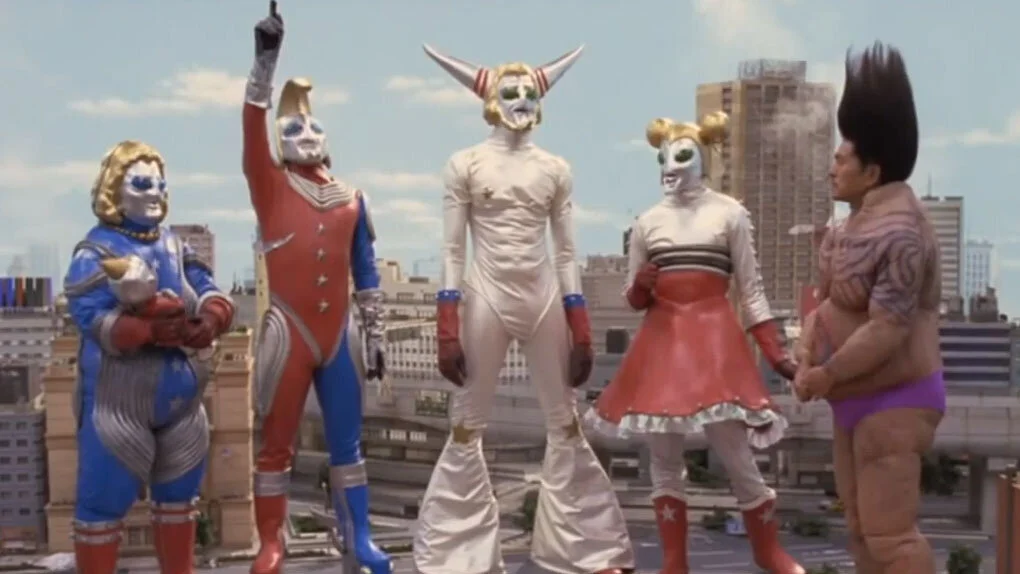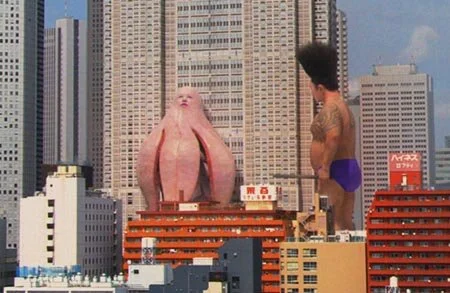BIG MAN JAPAN (2007)
Honestly, I’ve never really been a huge fan of giant monster movies. Not that I want my genre films based solely in reality, but on some cerebral level there has to be an aspect I can grasp onto. Rubber suits, cheap miniature sets, and poorly dubbed dialogue never helped win me over either. You’d think with my appreciation of high-camp I would dig this sub-genre, but that just isn’t the case.
That was until just recently, when the strange DVD cover art for 2007’s BIG MAN JAPAN caught my eye. I just can’t say no to bizarre Asian cinema. Nothing about the film really stood out for me when I first watched it but, upon a recent viewing, it became apparent to me that BIG MAN JAPAN actually works on several different levels and is more thought-provoking than I initially perceived to be.
In this mockumentary, director Hitoshi Matsumoto (SYMBOL, R100) explores a Japan where bizarre kaiju invade on a regular basis. Some of them have a specific goal of destruction, while others just want to stink up the city. Masaru Daisatō (played by Matsumoto) has been given the task of protecting Tokyo from the onslaught of these monsters.
He achieves this by being super charged via electric shock through his nipples and growing to approximately 30 meters in height (about 100 feet).
Despite putting his life on the line battling giant creatures, Daisatō is perpetually ridiculed and feared by his fellow citizens.
His wife left him, his daughter doesn’t want to be associated with him, and he constantly struggles with the fact that he comes from a long lineage of massive monster killers whose legacy he can’t live up to.
I see many dualities between BIG MAN JAPAN and that of modern first responders, especially people working in law enforcement. I’m not sure if that was the intention of the filmmaker or not, but that’s what I took away from it.
Most of the kaiju in BIG MAN JAPAN look absurd, therefore underwhelming Daisatō’s critics. One thing he understands that they never will is that no matter how disarming they appear, they want to destroy the people and property that he is sworn to defend.
This is why most of them see him as a joke or, worse yet, a threat. This is the same way the majority of civilians view law enforcement that have to deal with drunks, mentally unstable individuals, and those whose desire is to disrupt a peaceful existence.
Seeing Daisatō’s family broken up over the stress his work puts them through is very similar to the same tribulations first responders’ families go through. The audience sees how his daughter is picked on in school, and does not want to be associated with her father due to his portrayal in the media. This seems very appropriate for today’s political climate and the treatment of first responders in the media.
The flashback scenes in BIG MAN JAPAN show Daisatō’s grandfather appreciated by the community for his dedication and sacrifice for providing protection. Both Daisatō’s father and grandfather were revered for their service. Though not given the same respect, he still sees it as his duty to defend those who hate and fear him.
This also mirrors the change in people’s perceptions of first responders over the years.
Regardless of the lack of accolades, Daisatō still does his job to the best of his ability, and at the end of the day, just wants to go home safe to his humble life.
Written by Matsumoto and frequent collaborator Mitsuyoshi Takasu, BIG MAN JAPAN is a hilarious kaiju film that falls somewhere between Monty Python’s THE MEANING OF LIFE and Christopher Guest’s BEST IN SHOW. Perhaps I’m reading too much into it—I have a habit of that—but between the laughs and absurdity there is a sense of empathy given towards first responders, which is pretty rare and makes BIG MAN JAPAN truly unique.





